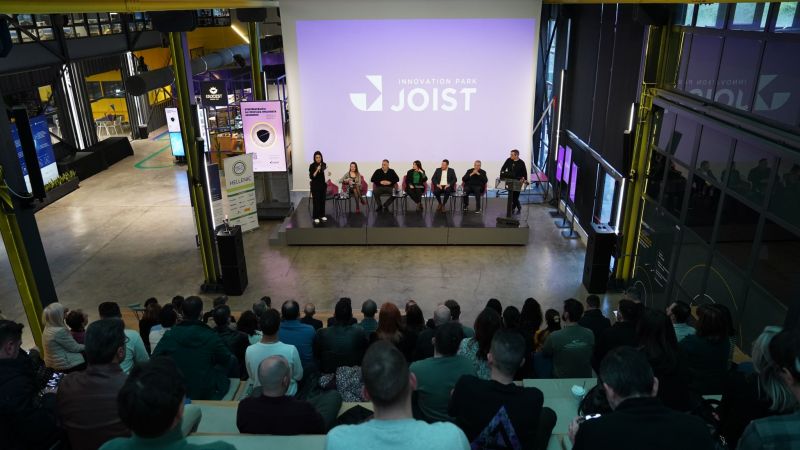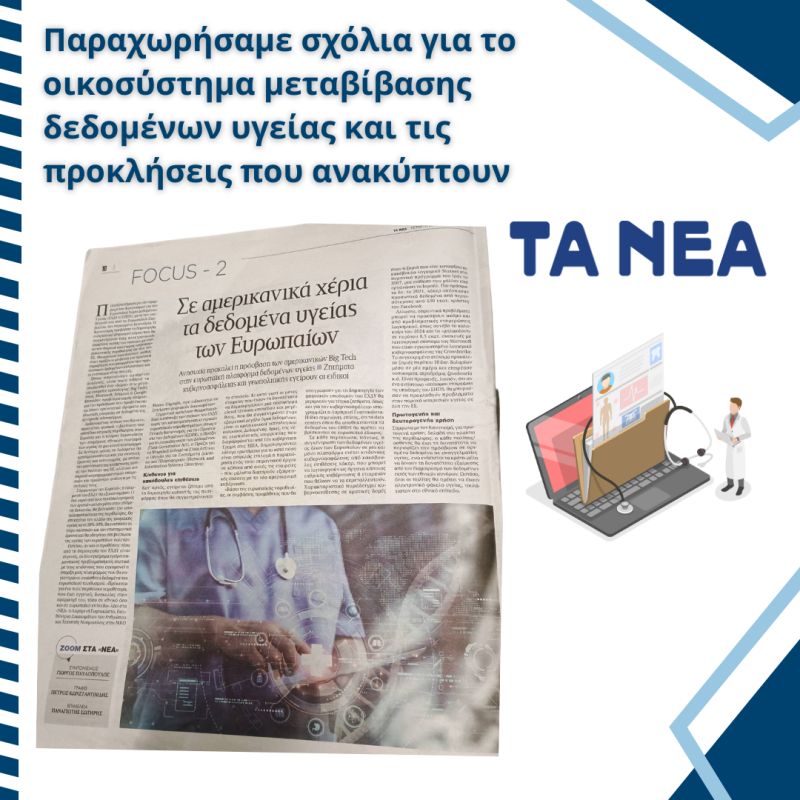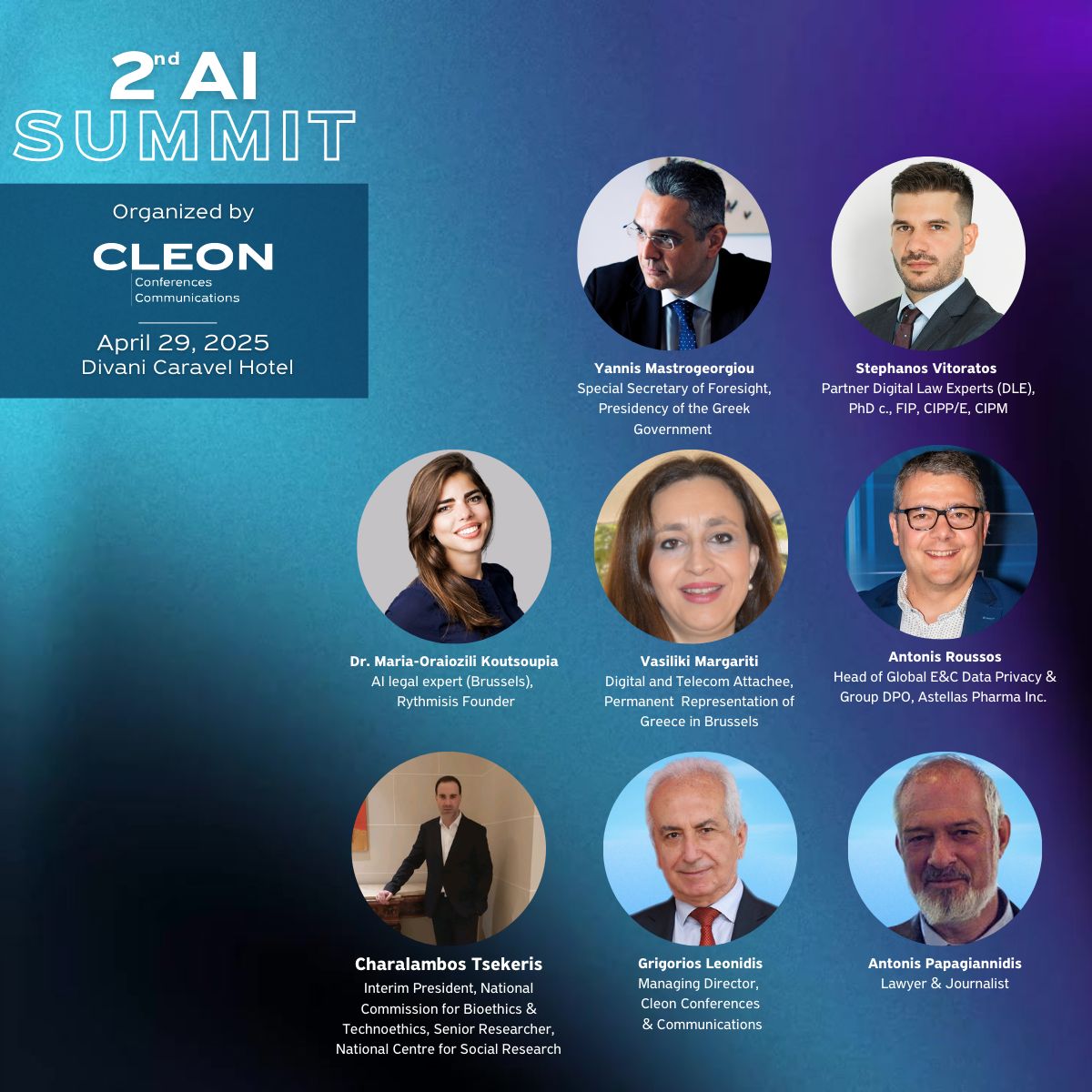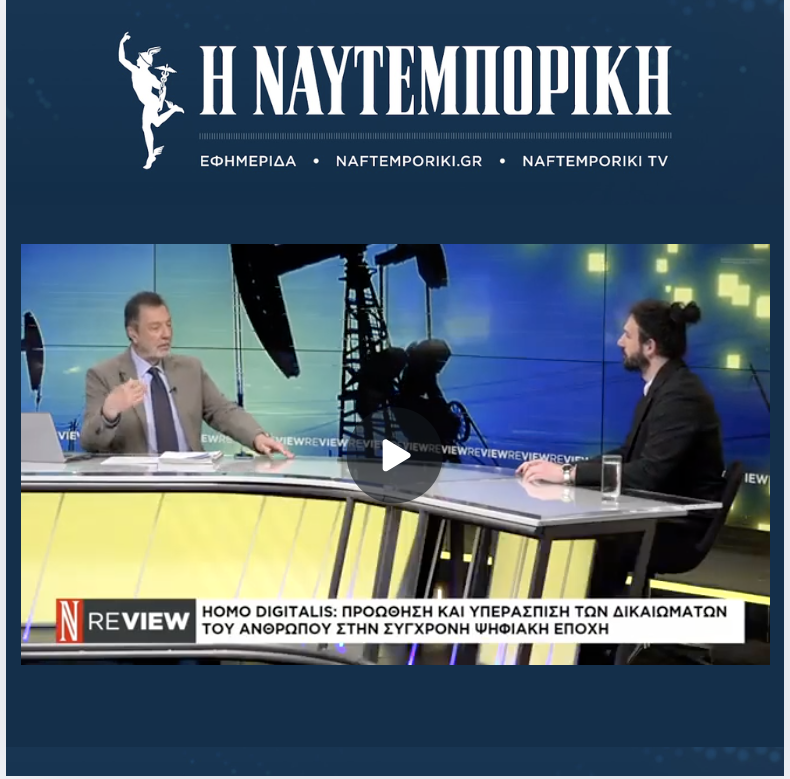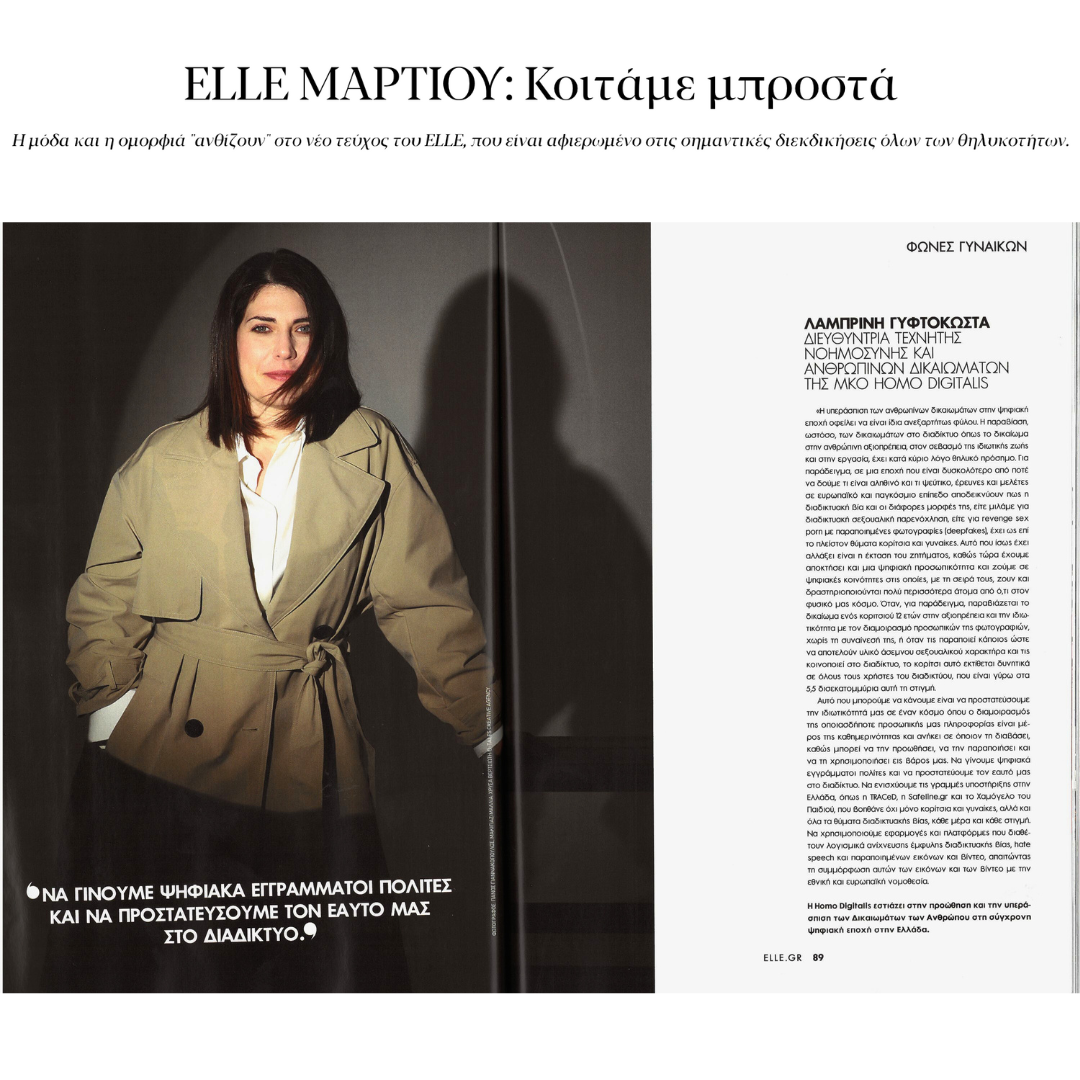Homo Digitalis' Speech at the 15th InfoCom Security Conference 2025 Concluded Successfully
The 15th InfoCom Security Conference 2025 was successfully completed, with Homo Digitalis once again offering its patronage to the event!
Our Board of Directors was represented by Konstantinos Kakavoulis, who also delivered the opening address on the second day of the conference.
We warmly thank the organizing team (SmartPress S.A., Vasilis Amanatidis, IT Security Pro) for the excellent collaboration throughout the event.
Homo Digitalis co-organized and participated in the event "Cybersecurity and Data Protection: Resilience, Compliance, Innovation" at JOIST
Two weeks ago, Homo Digitalis co-organized and participated in the event “Cybersecurity and Data Protection: Resilience, Compliance, Innovation” at JOIST Innovation Park, in Larissa, Greece.
Our Director on Human Rights & AI, Lamprini Gyftokosta represented us there, while our member Anastasios Arampatzis representing Bora – Cybersecurity Marketing moderated the discussion!
With a focus on raising awareness among SMEs and entrepreneurs on data protection and cybersecurity, our panel brought together key experts to explore security, compliance, and innovation, ensuring a privacy preserving digital future.
The list of our esteemed co-panelists included:
-Michail Bletsas Governor, National Cybersecurity Authority
-Panagiotis Soulos – ISC2 Hellenic Chapter, Audit Committee Member, Information Security GRC Senior Manager, STEELMET Corporate Services
-Yiannis Koukoùras – ISC2 Hellenic Chapter Member, Managing Director, TwelveSec
-Karina Iskandarova – Founder, CharismaWorks
A huge thank you to JOIST’s team and the rest of co-organizers, speakers, and participants for this wonderful evening.
Interview of Homo Digitalis in the newspaper "TA NEA" on the ΕHDS
On the occasion of the entry into force of the provisions of Regulation 2025/327 regarding the European Health Data Space (EHDS), journalist Petros Konstantinidis and the newspaper TA NEA published an article highlighting the concerns surrounding the access of American Big Tech companies to the European health data platform.
What are the cybersecurity and geopolitical issues that arise?
Our team was represented by Lamprini Gyftokosta, who provided relevant comments, which you can read in the online version of the article available here.
We thank the journalist for his interest in our work.
The provisions of Regulation 2025/327 will come into effect on March 26, 2027, and will be of significant concern in the near future.
We Sponsor and Speak at the 15th InfoCom Security 2025!
We are excited to announce that Homo Digitalis is once again offering its sponsorship to the 15th InfoCom Security 2025! This special anniversary edition will take place on April 2 & 3 at the Athens Conservatory.
Our Board Member, Konstantinos Kakavoulis, will proudly represent us at the event and deliver the opening keynote speech on the second day of the conference!
Registrations are open and free!
You can secure your spot and explore the full two-day agenda here.
A huge thank you to the organizing team (SmartPress S.A., IT Security Pro) for the excellent collaboration in making this event possible!
Registration for the 2nd AI Summit of Cleon Conferences, under the auspices of Homo Digitalis, is now open
CLEON Conferences & Communications is organizing the 2nd AI SUMMIT under the auspices of the Ministry of Digital Governance, SEKEE, ISACA, Homo Digitalis, and Rythmisis.
The conference will be moderated by lawyer and journalist Antonis Papagiannidis, while a speech will also be given by Stefanos Vitoratos, co-founder of Homo Digitalis and lawyer.
The conference will take place on Tuesday, April 29, at the Divani Caravel Hotel in Athens.
Don’t miss the opportunity to stay informed about the latest developments and trends in AI!
You can register here.
Homo Digitalis Interview on NAFTEMPORIKI TV’s "REVIEW" with Takis Spiliopoulos
Yesterday evening, Homo Digitalis was featured on NAFTEMPORIKI TV’s show “REVIEW”, hosted by journalist Takis Spiliopoulos.
Representing our team, Eleftherios Chelioudakis participated in an engaging discussion about our work in public awareness and policy shaping.
Key Discussion Points
–Targeted commercial advertising and its ethical implications
–Addiction to digital platforms
–AI legislation and its impact on society
NGI TALER – Privacy-Focused Digital Payments
We also discussed NGI – The Next Generation Internet and its open funding calls under NGI TALER, a European Commission co-funded initiative aimed at developing a privacy-focused digital payment platform using open-source principles.
(Interested applicants can apply here)
Other Featured Guests
The episode also included insightful discussions with:
–Antonis Ballis, Assistant Professor of Financial Technology, on cash and digital transactions
–Dimitris Papastergiou, Minister of Digital Governance, on the future of digital policy
A huge thank you to NAFTEMPORIKI TV, Takis Spiliopoulos, and the entire journalistic team, including Liana Thanou, for the kind invitation and the opportunity to share our work.
Watch the full interview here.
From Secrecy to Transparency: The Five-Year Battle for the Publication of Police Camera Operation Decisions
Strategic legal action takes time, but its outcomes benefit society as a whole, strengthening public trust in institutions.
In December 2020, Homo Digitalis, in collaboration with Reporters United and The Press Project, formally requested access to the Hellenic Police’s decisions regarding the operation of drones and other portable cameras in public spaces, as stipulated in Article 12 of Presidential Decree 75/2020. Despite the legal obligation to publish these decisions publicly, the police refused access, disregarding the transparency required by law.
A few months later, in May 2021, we filed a joint complaint before the Hellenic Data Protection Authority (HDPA), citing repeated non-compliance by the police—at least 67 times over a short period. The HDPA launched an investigation into the legality of these practices.
In early 2024, we submitted a request for access to HDPA documents to better understand the progress of the investigation. Correspondence between the Hellenic Police and the HDPA revealed that, even as of March 2024, the police continued to argue that Presidential Decree 75/2020 did not require them to publish camera operation decisions, despite the HDPA’s opposing view.
Yesterday, through a report by journalist Giannis Bazaios in Efimerida ton Syntakton, we learned that such a decision had been published on the Hellenic Police’s website. Indeed, upon verification, we found that as of February 17, 2025, the police had changed their practice and begun publishing these decisions as required by law. The report was published today online here.
From the initial refusal in 2020, it took five years for this change to be implemented. We now eagerly await the final decision of the HDPA and the conclusion of its investigation, which will establish a definitive framework for transparency and accountability within law enforcement.
Homo Digitalis Interview on ANT1's show "Your Business Can" with Fai Chrysοchoou
On Sunday, March 9, Homo Digitalis was featured on ANT1’s program “Your Business Can”, hosted by journalist Fai Chrysοchoou.
A huge thank you to the journalist and her team, including Toni Aravadinos, for the kind invitation and their interest in our work!
Key Discussion Points
Representing Homo Digitalis, Eleftherios Chelioudakis spoke about:
–Artificial Intelligence and its regulatory framework
–How legislation acts as a driver of innovation, trust, and entrepreneurship
The Reality of AI & Business Growth
Many non-EU tech companies have historically followed the “Move Fast and Break Things” model, leading to:
–Numerous violations & fines imposed by European regulators
–Social polarization and addiction to social media
–The spread of misinformation
Why Compliance is an Advantage
–Businesses that comply with regulations gain a competitive edge
–Strong legal foundations enable sustainable growth
-Compliance fosters trust, stability, and access to the unified digital market
Ultimately, legislation does not hinder business—it fuels long-term success and strengthens democratic societies!
Interview with Lamprini Gyftokosta of Homo Digitalis in ELLE GREECE’s Feature for International Women’s Day
The magazine ELLE GREECE marks this year’s International Women’s Day (March 8) as a call to action—an opportunity to highlight the power and necessity of demanding rights, the right of every woman to speak up, take up space, and resist the violence inflicted upon her.
In her feature, journalist Foteini Simou brings together women and femininities who raise their voices in unison! They perform on stage, write poetry and songs, engage in drag, and examine issues ranging from the Rule of Law to the unchecked and insatiable digital expansion of Artificial Intelligence.
We are deeply honored that Lamprini Gyftokosta represents Homo Digitalis in this feature, speaking about the urgent need to protect our privacy in a world where sharing personal information has become an everyday norm!
Featured Participants:
The tribute also includes remarkable voices such as:
–Natasa Exintaveloni (actress)
–Erofili Kokkali (writer, sexual health counselor)
–Eleni Alexandraki (director)
–Olina (musician)
–Maria Konstantopoulou (poet, singer)
–Rainbow Mermaids – Katina Bella & Mystic Van Rouge (drag queens)
–Stavroula Papadaki (poet)
–Anastasia Yamali (journalist)
–Maria Nathanael (legal advisor, communications manager at Vouliwatch)
–Christianna Stylianidou (legal advisor, researcher at Vouliwatch)
–Eleni Apostolopoulou (actress, director, member of Potlatch Publications)
–Elli Kriona Saranti (lawyer, legal coordinator at HIAS Greece)
Read the full feature in the March issue of ELLE, available at kiosks and onlinehere.

